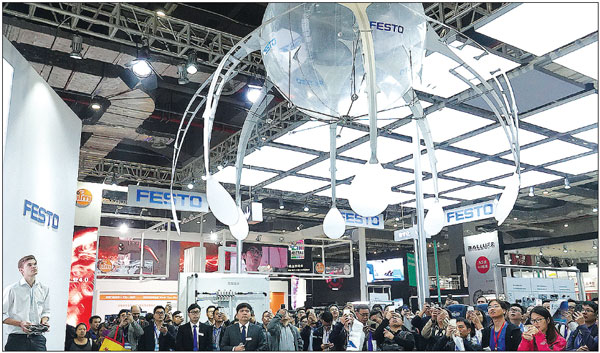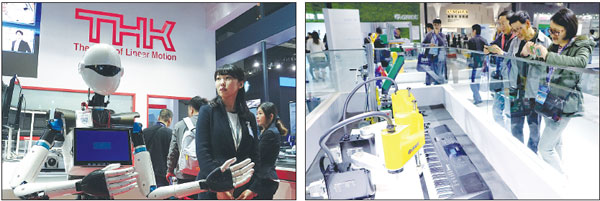Placing the chips on Artificial Intelligence
 |
|
A bionic robot developed by Festo, a worldwide supplier of automation technology from Germany, is shown to the public at the China International Industry Fair, held in Shanghai from Nov 7 to 11. The robot can creep, the first of its kind in the world. Photos by Gao Erqiang / China Daily |
In line with the national strategy, Shanghai has outlined plans to drive growth by bolstering the development of its AI sector
Shanghai released a new municipal plan in mid-November which aims to make the development of artificial intelligence a new growth engine and expand the industry scale of AI-related sectors to more than 100 billion yuan ($15 billion) by 2020.
According to The Opinions on Promoting the City's Next Generation of AI Development, the city will undertake 21 measures to facilitate the development of this industry, such as forming a world-class industry cluster, nurturing 10 AI innovative enterprises that have substantial influence, building six AI innovative application demonstration areas, and launching more than 100 application demonstration projects.
"Although Baidu, Alibaba and Tencent are not based in Shanghai, the city could be the birthplace of AI unicorn companies as conditions here are mature," said Chen Ming-bo, director of the Shanghai Commission of Economy and Information Technology.
Chen added that Shanghai's wealth of big data resources, wide application of smart technologies, and large pool of research talents have laid a solid foundation for the development of the AI industry.
Shanghai's approach
As many as 260,000 items have been categorized into the municipal government's data sharing pool, and a city-wide information exchange and sharing platform will be launched by the end of the year. Meanwhile, the growing amount of data shared by public service organizations including weather, electricity, gas and communications will enable enterprises and public entities to gain more business value.
"The plan pays great attention to the application of AI technology," said Wei Hui, a professor from Fudan University. "Shanghai's abundant data base in sectors such as public transportation will likely enable some creative applications in the future."
Wang Yanfeng, deputy dean of Shanghai Jiao Tong University's school of electronic information and electrical engineering, said: "Shanghai's ambition to build an innovative technology center with global influence would make the city a mega zone for AI exploitation and application. In addition, its openness and talents from top universities will put Shanghai in a vantage point."
According to the plan, Shanghai would deepen the integration of AI and related industries including high-end equipment, integrated circuits, biomedical, and automotive to establish a set of innovation centers for intelligent manufacturing and industrial internet. In addition, AI industrial clusters will be built across the city to spur the development of intelligent driving, intelligent robots and intelligent software and hardware. Policies aimed at attracting talents both from home and abroad will be established.
"Shanghai is currently building an AI development alliance, and nearly 300 major enterprises, investment and financing institutions, as well as research institutions have been approached. We will work on attracting global AI enterprises to locate their regional headquarters and innovation centers in Shanghai," Chen said.
AI: The buzzword in China
During this year's five-day China International Industry Fair (CIIF) in Shanghai, a special AI area was opened for the first time in the exhibition's history.
"With the help of our lower-limb exoskeleton robot that is equipped with AI technology, wheelchair-bound users can practice standing up and walking," said Yang Zhihao, marketing engineer from Fourier Intelligence.
Yang pointed out that the product, which is the nation's first commercialization exoskeleton, will allow users to perform similar functions at one-third of the cost of its foreign counterparts. He noted that AI robots will also help to address the shortage of rehabilitation therapists in the country.
According to public information, there are more than 20 million physically disabled people in China. China National Radio reported that the market size of exoskeletal robots will expand to 14 billion yuan by 2021.
AI technology has already proven to be beneficial to manufacturers as well. Lin Yuchun, the owner of Xie Mo Fang, a shoe business in Chengdu, said that such technologies have helped the company to design its products 30 percent quicker, resulting in a 25 percent growth in annual profits in the past year.
"Traditionally, a shoe designer has to draw hundreds of styles and customers would only pick one or two of them. After using the new AI shoe design and manufacturing system, which is tailor-made for our factory, we have simplified the procedure greatly," he said.
In early November, the company opened an experience store equipped with a 3D foot scanner in Shanghai's Pudong New Area. This device can collect data, color preference, heel height and shape, material and accessories to fashion a customized product for consumers.
AI pathfinders
Shanghai's move to make this industry a growth engine reflects the national focus on AI development as well. In July, the State Council illustrated a national AI development model, detailing a three-step strategy to increase the value of China's AI industry to 1 trillion yuan by 2030 and turn the country into one of the key global centers for AI innovation in terms of technology and application.
"AI will be a major driver in industrial upgrading and will be widely used in manufacturing, smart city plans, agriculture, defense and other sectors," Jiao Tong University's Wang said.
He pointed out that one key characteristic of the latest phase in AI development in China is that industrial application has become far more prevalent than academic research. As such, applications of AI technology can be seen in a wide range of sectors including security and financial.
Chinese tech giants Baidu, Alibaba, Tencent and iFlytek have also been embracing the new technology, as evidenced by Baidu's autonomous driving platform, an urban brain created by Alibaba, a medical imaging brain built by Tencent, and an intelligent voice platform supported by iFlytek.
Nasdaq-listed Baidu, China's biggest search engine, said in its third quarter report that more than 70 companies, including international automotive giants Ford and Daimler, had joined the company's open autonomous driving platform called "Project Apollo".
Baidu co-founder and CEO Li Yanhong said that the company will work together with China's Xiongan New Area, a new economic zone in Hebei, to transform it into a leading intelligent transportation city.
Over at Alibaba Group, AI technology has been pivotal in helping it amass an average of 117 million yuan in sales per minute during this year's Nov 11 Singles Day. Alibaba generated a new record of 168.2 billion yuan in revenue during this year's one-day shopping extravaganza.
The New York-listed company announced last month that it would invest $15 billion over the next three years in cutting-edge technologies including AI through its global research effort called Discovery, Adventure, Momentum and Outlook (Damo) Academy.
This planned investment is more than double that of the $6.4 billion the company spent on research in its past three financial years, according to Bloomberg data.
Shenzhen-based Tencent said in August that it would similarly boost its investment in AI. Tencent is the world's largest games company by revenue, and is also China's biggest social media operator.
An AI research lab led by former Microsoft scientist Yu Dong was set up by Tencent in Seattle in May. The facility hires more than 50 AI researchers who are backed by about 200 engineers in the Chinese mainland, reported the South China Morning Post.
Meanwhile, an artificial intelligence-enabled robot developed by iFlytek, a leading Chinese artificial intelligence company, has also passed the written test by China's national medical licensing examination, an essential entrance exam for doctors, making it the first robot in the world to pass such an exam.
The Hefei, Anhui province-based voice recognition firm said it will set up a 1.02 billion yuan fund to finance startups that have core technologies but lack business know-how, or companies that excel in commercializing products but are unable to integrate AI into their devices.
Boom or doom?
Jiao Tong University's Wang said that China is already in a competitive position for AI development because of its massive market size and the quality of its research and market applications.
CCTV.com, citing sources from the Ministry of Industry and Information Technology, reported that China's AI technology development is nearly at the same level as developed countries in terms of deep learning thesis and number of patents.
However, Chinese AI researches are still lagging behind their international peers when it comes to working on creativity and originating open source material, said Wang.
There are 709 AI-related enterprises in China as of 2016, only second to the US, according to Chinese research firm CCID Consulting data. The total industrial scale of the Chinese AI sector reached nearly 300 billion yuan last year, and the figure is projected to rise to 360 billion yuan this year.
"Talent is the greatest strength of China and Shanghai, and after all these years of higher education, we now have a substantial amount of talent in computer science, automation and electronic engineering, which are all related to AI," said Wei.
"To some extent, China and the United States are entering the no man's land for AI technology innovation, application, as well as supporting policies, regulations, ethics and culture, almost at the same time. This is an extremely exciting opportunity for the tech industry in China," said Liu Qingfeng, founder and chairman of iFlytek.
But further development of the AI industry could also spell more unemployment. According to an article published on the official website of Science magazine, automation could push down global employment - a measure known as the labor participation rate - to just 50 percent by 2045. The article also cited a report by Oxford Martin School which said that automation will threaten 77 percent of the jobs in China, compared with just 47 percent of jobs in the United States.
But Lin is confident that machines will never completely replace humans.
"The AI shoe design system cannot replace the core work of designers, but it does offer inspiration and help in recommending particular samples, making the whole process much more efficient and economical," he said.
"As long as we are moving in the right direction, AI technology can be an important assistant for everybody, just like the mobile phones we are using today," said Liu.
China's State Council has also addressed this issue, saying that a better legal and social security system must be in place to prevent a situation where a few AI giants are responsible for creating the majority of social wealth.
wang_ying@chinadaily.com.cn
|
A robot developed by THK Co illustrates the designing capability of the company's drivers products (left) at the China International Industry Fair. A robot produced by Gree attracts visitors while playing a piano at the fair. |










